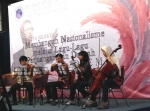Studium Generale KU-4078 Addie MS: “Weaving harmony, Constructing Nation”

BANDUNG, itb.ac.id – General lecture KU-4078 Institut Teknologi Bandung (ITB) presented Addie Muljadi Sumaatmadja, a musician, song composer, music producer, and one of the founders of Twilite Orchestra, Wednesday (31/03/2021). ITB YouTube channel and Zoom was used as the platform on this general lecture. It was moderated by Ir. R. Sugeng Joko Sarwono M.T., Ph. D., one of the Physical Engineering lecturers at ITB.
In this lecture Mr. Addie took an opportunity to tell his story about his early music career up to achieving his greatest achievement, which is making Indonesia proud by astounding the world with his musical performance. This general lecture was opened with remarks by Institut Teknologi Bandung Rector Prof. Reini Wirahadikusumah, Ph. D.
Mr. Addie starts his lecture by telling his struggle in starting his music career from zero, right after he graduated high school. According to him, there are three main challenges in his musical career that finally change his way of life.
The first challenge is in determining his direction and purpose in life. He met this challenge when his friends have started to find a clear path that they wanted to take, such as to be an engineer, doctor, and architect. The young Addie then decided to pick the music route as his path of life.
However, this decision is not without an obstacle. In the beginning, he needs to face discouragement from his father that wants him to continue the family business. Nevertheless, he persists in his decision. “Opa, I will only live once, thus I want to do what I love in life,” told Mr. Addie to his father. “Since then, I never receive any allowance except for a place to sleep and for food, I keep doing this to achieve my dream,” he continues.
The second challenge appears when he already established a musical career and experienced the hardship of life. In 1982 he was offered a job to write an album for Vina Panduwinata. Realizing that this is a major project, he agrees to accept on one condition, that is he needs to work with an orchestra from the Philippines.
At that time, a lot of people questioned his decision, but later he proved that he was able to accomplish this task even without payment. The success of this project had made a name for Mr. Addie, he gained a lot of prestige and trust. “When I choose the orchestra that I preferred, nobody would question my decision and would comply instantly,” told Mr. Addie.
The third challenge happens when he is at the top of his career, when he is in a very comfortable position. He felt a lot of emptiness and fatigue. In this phase, Mr. Addie also experiences a brief time of financial downturn. Nevertheless, he was able to recover and get himself back on track. In 1991 he founded the Twilite Orchestra with Indra Bakrie and Oddie Agam.
Mr. Addie needs to face some obstacles when developing the Twilite Orchestra. One of the examples is the need for a suitable room for a performance without extra amplification, which is nonexistent in Indonesia. This leads to a massive extra cost needed to perform a concert. First, they need to set up a stage, and then rent a suitable sound system. “The very high cost in performing an orchestra is already a challenge in itself,” said Mr. Addie.
Mr. Addie also tells his stories about how his musical orientation is changing over time. In his early life music was a means for him to truly live his life. However, as time went on, he had another goal. He wants to make his nation proud by showing his musical works to the world. “I got a huge motivation in building my nation through music,” he said. One of his biggest contributions is by remastering the Indonesia national song “Indonesia Raya”.

“In Indonesia, music is still considered as mere entertainment. However, the developed nation has considered music as a more serious matter,” he said. In many developed nations, some people already use music as a tool for medical treatment. Moreover, music has been well integrated into their education and started to be taught in the early years. “We need to feel like the part of the orchestra itself. Our roles are different, there is no need to consider us as the same. But we need to strive to achieve harmony and unity in difference, just like an orchestra” Mr. Addie said as a closing remark.
Reporter : Yoel Enrico Meiliano
Translator : Favian Aldilla R

scan for download








